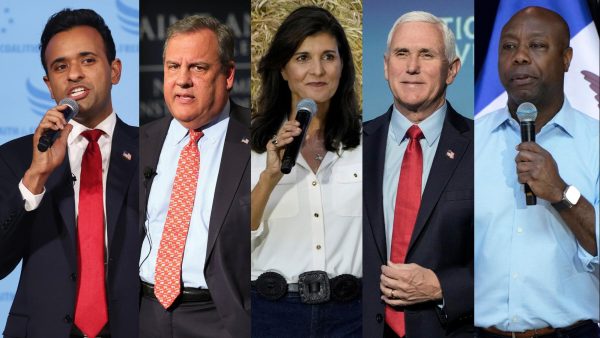Let’s keep it n(uclear)eutral?
January 13, 2018
Ever since North Korea’s split from South Korea in World War II’s aftermath, North Korea has maintained a very sour relationship with the United States. The U.S. continues to cultivate a healthy alliance with South Korea, having stationed thousands of its own troops in Hawaii, the closest state to the Korean Demilitarized Zone [1]. However, Washington’s relationship with North Korea has worsened over the years, especially since Trump came into office.
Almost a year ago, Kim Jong-Un announced that he was almost done making his intercontinental ballistic missile, claiming it could reach almost any target area desire in the United States. At the time, newly-elected President Trump fired back with a tweet saying that North Korea could never reach America. Brinda Rao ’21 comments, “I am not surprised by Trump’s reaction. What more can we expect from him?” Trump and Kim truly do complement each other, bringing out each other’s undiplomatic natures. The American public has not responded well to this exchange, as tweets, memes, and posts ridiculing the two individuals have permeated every corner of the Internet. Even after the tweets, both countries have continued to display their military strength, with North Korea trumpeting its military drills in a Pyongyang parade in early October and the U.S. dropping impressive yet morally controversial bombs in Afghanistan. The latter has also been developing THAAD, short for Terminal High Altitude Area Defense. THAAD is tailored to shoot down short-, medium- and intermediate-range ballistic missiles. A few months ago, US’s THAAD missile defenses successfully hit a stimulated intermediate-range ballistic missile which was analogous to North Korea’s IRDM [2].
The Korean War armistice should have ended all tensions between the countries, but it failed to decrease tensions, hardly acting as a safeguard buffer in the Korean peninsula. The United Nations and South Korea have both accused North Korea of inflicting unnecessary harm on its own citizens. The UN went so far as to request a meeting with North Korea after footage from cameras around the South Korean border showed North Korean soldiers firing their weapons at a fleeing defector [3]. “It was shocking,” Arul Gupta ’20 comments. “Not only that, but it was disappointing to see how the North Korean troops completely disregarded the armistice.” Arul brings up a good point, as it was in fact shocking to see the lines the North Korean troops were willing to cross only for one deflector. The question then arises: will there be a nuclear war? After all we have seen, it is inevitable. None of the peace treaties nor the armistices have derailed North Korea’s plans, and it is highly unlikely that diplomatic progress will forge a new path in the immediate future.
[1] https://www.theguardian.com/us-news/2017/aug/09/what-is-the-us-militarys-presence-in-south-east-asia
[2] http://www.cnn.com/2017/07/30/politics/us-military-tests-thaad-system/index.html
[3] http://www.cnn.com/2017/11/21/asia/north-korea-defector/index.html




